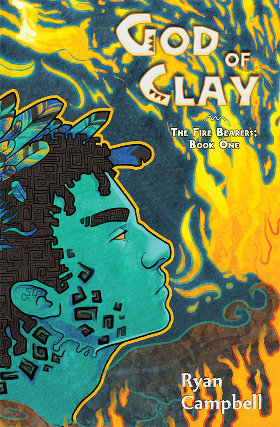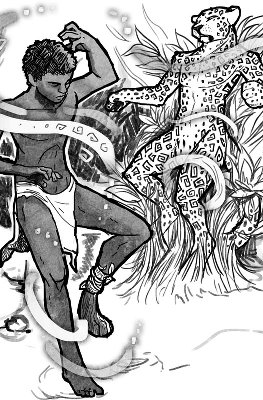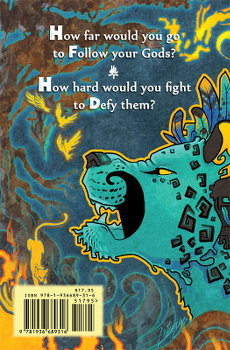Review: 'God of Clay', by Ryan Campbell
 The cover bears the line, The Fire Bearers: Book One, letting you know it ends on a cliffhanger. It is, in fact, the first volume of a trilogy.
The cover bears the line, The Fire Bearers: Book One, letting you know it ends on a cliffhanger. It is, in fact, the first volume of a trilogy.
In the prehistoric past, when men shared the world with anthropomorphized animal-gods, there were two very different brothers in a tribe. Clay, the older brother, respects and worships the old gods who control all men’s lives, while irreverent Laughing Dog mocks the unseen gods, and swears that he controls his own destiny. The brothers love each other, in their own ways, but their differences lead both to disaster.
Doto crouched in the forest, his clawed fingers pressing down beneath the grasses and bed of fallen leaves to touch the earth below. He went out, out, into the soil, into the trunks of the trees, the branches and leaves, the grasses and ferns. He felt the air swaying branches, the sunlight on the leaves. He felt the rodents skittering across the forest floor. […] He leapt from branch to branch and winged over the canopy. He spread himself out, farther and farther. Through the keen eyes of the birds and the considering gaze of a monkey clinging to a branch above, he could see himself, crouched on the ground far below, so still that he was nearly undetectable. […] All the surrounding life lived through him. But all was not right. There was an uneasiness in the forest, somewhere around the edges. Could great Atekye have risen herself up in the south of the forest, swelling her swamps to flood the forest floor once again? (p. 1)
Sofawolf Press, September 2013, trade paperback $17.95 [on Amazon] ([5] + 259 [+ 2] pages), Kindle $7.99. Illustrated by Zhivago.
Doto is a young god who usually looks like a humanoid leopard; the son of Kwaee, king of the gods, who looks like a humanoid leopard with a feathery crest. But Kwaee has become irascible and sullen to all life, mortal and the other gods alike. He has withdrawn from the forest to sulk upon his throne. Doto learns that the uneasiness is caused by the return to the forest of Ogya, the powerful god of fire and destruction, with his acolytes, the Fire Bearers. Doto races to his father to report the dread news, so that Kwaee will finally rouse himself and deal with the menace. Instead, Kwaee belittles him for bothering him with imaginary fears. He orders Doto to go and capture a Fire Bearer, if they are real.
 The Fire Bearers are, of course, humans, who have migrated across the savannah and come to the forest. The presence of baboons, grey parrots, gorillas, hyenas, and elephants clearly establish this as ancient Africa. Clay and Laughing Dog’s tribe has been driven to the edge of the forest by the increasing desertification of the sahel and savannah. (The development and spread of the Sahara Desert?) The tribe’s ancient legends of the forbidden forest keep them from venturing into the forest. But Laughing Dog’s disbelief in the gods leads him to publicly break the taboos.
The Fire Bearers are, of course, humans, who have migrated across the savannah and come to the forest. The presence of baboons, grey parrots, gorillas, hyenas, and elephants clearly establish this as ancient Africa. Clay and Laughing Dog’s tribe has been driven to the edge of the forest by the increasing desertification of the sahel and savannah. (The development and spread of the Sahara Desert?) The tribe’s ancient legends of the forbidden forest keep them from venturing into the forest. But Laughing Dog’s disbelief in the gods leads him to publicly break the taboos.
Laughing Dog’s iconoclasm results in his exile from the tribe, and Clay’s unexpected vulnerability to the prowling Doto. God of Clay splits into two stories told in mostly alternating chapters; those of Clay being led south as Doto’s captive, further into the forbidden forest-jungle; and of Laughing Dog, who ventures alone north, back into their tribe’s ancestral lands to learn what has become of the savannah-turned-desert. Their adventure become a learning experience for all three, each discovering that the nature of the world, of life and of the gods, is not what he was brought up to believe.
Were their elders mistaken? Or lying to them? Or is the nature of things changing and evolving? Do the gods control the world, or does the world control them despite their power and arrogance? Clay denies that humans are controlled by Ogya, the god of fire, but he has to admit that Ogya is one of gods whom the tribe worships, and humans are the only animals that have fire. Is Ogya “a benevolent trickster [or] a malevolent, world-consuming monster”? (p. 123) Is he manipulating humans without their awareness? And are humans just another species of animal, or something different?
God of Clay does not include any anthropomorphic animals, just anthropomorphic gods. But there are several of them: Father Fam, Mother Wem, Kwaee of the forest, his son Doto, Sarmu of the savannah, Ogya of fire and the wastelands, Mpo of the ocean, and others:
He [Doto] twitched his ears backward towards the sounds of thousands of tiny feet moving over the loam. His fur lifted and stood on end with the familiar energy in the air that told him a god was nearby – a lesser god, perhaps, but a god nonetheless. Behind him, a parade of ants was approaching, winding their way around roots and fallen leaves. Carrying assorted bits of food and earth. A very large ant led them, his head half as high as Doto’s knee, and he walked upright, in the manner of the gods. He was munching a pear, his mandibles clicking in a rhythmic pattern. He wore an expression of deep focus, but looked up when Doto’s shadow fell over him. ‘Brother Doto.’ He grinned between bites of fruit. He did not stop marching forward, nor did his subjects stop moving behind him.
‘Good day, Brother Atetea,’ Doto said, dipping his head. ‘Where are you headed today?’
The god shrugged his four shoulders. ‘We are building a new palace,’ he said around his mouthful. ‘This one bigger than the last. There will be so much more room for our larders! Rooms upon rooms of sticky, tasty fruit. I would invite you to come inside, but as usual, you are so terribly oversized.’
‘Yes,’ Doto agreed. ‘I am.’ He considered. Atetea might be only god of ants, but there were ants throughout the forest. ‘Tell me, Brother, have you noticed the stillness in the forest today?’ (p. 3)
He [Kwaee] was a large leopard, greater in size than Doto, and across his rosettes the sun played even at night, granting him its brilliance and yet leaving him – when he wished to be – unseeable. The end of his tail twitched in impatience. He had apparently been consuming a flamingo, one gnawed pink leg clutched between his clawed fingers, and he did not look pleased at all to see Doto. The brightly colored feathers that sprouted from his brow and temples were raised high and imperious. (p. 7)
Then his [Doto’s] power was cut off, his awareness of the stone going blind. The water of the river rose up before him in a great, silvery hump, and broke. Eyes breached the surface of the river, huge yellow circles each as wide across as Doto’s reach from fingertips to toes, black slits for pupils. The water rushed away from dark green scales covering a massive head. Fanged jaws so large that they could nip up elephants for treats emerged, rivulets streaming from their sides. It was Asubonten herself, goddess of the river, the crocodile who drank the night, and she was angry. (pgs. 171-172)
The Fire Bearers: Book One is not just a learning experience for the three. Each is subtly, physically changed, for better or ill. To say how, or to where God of Clay leads, would give away too many spoilers. Just know that, despite what each of them goes through, their unexpected journeys have just begun. And that the reader is left, frustrated, anxiously awaiting Book Two. God of Clay, which debuted at RainFurrest 2013, has a wraparound cover and ten illustrations by Zhivago.
P.S. Flayrah's delay in posting this review has enabled me to announce that God of Clay is the winner of the Furry Writers' Guild's Cóyotl Award for the Best Novel of 2013, as announced at an awards ceremony at RainFurrest 2014 in Seattle on September 26.
About the author
Fred Patten — read stories — contact (login required)a retired former librarian from North Hollywood, California, interested in general anthropomorphics

Comments
This is tagged 'opinion,' but there's no opinion here besides maybe looking forward to a sequel. Where's the review?
It's really, really well-written, with lots of clever surprises that kept me reading through it and resenting any interruptions. I am eagerly awaiting Book 2 of The Fire Bearers.
Fred Patten
Post new comment